Get Heptapod
Heptapod is Free and Open Source Software: see the Source downloads section below.
We also provide public binary downloads for testing purposes: see the Docker testing images section below.
However, starting with Heptapod 17.6.0, the binary packages for production are available only from Cloudcrane private registries on orus.io, our Heptapod instance. Registration is required, and will be free of charge until April 1st, 2025.
Binary packages for all prior versions are still available through the previous public channels and will keep on being updated there if needed.
Registration procedure
During the first quarter of 2025, registration will be enough to download our production-grade binary packages.
Early in the second quarter, we will make access to the production packages depend on a paying subscription, whose pratical details are not fully determined yet. The target price tag would be €300 (taxes excluded) per month. We might make special conditions for the likes of charities and education. Please contact us if you feel that your organization should be eligible to special conditions.
Source downloads and testing versions will keep on being public.
Here are the detailed steps to register.
Step 1: Orus sign-in page
Start with the orus.io sign-in page
Click the "sign in with Orus". You will be redirected to id.orus.io, our Keycloak single sign-on.
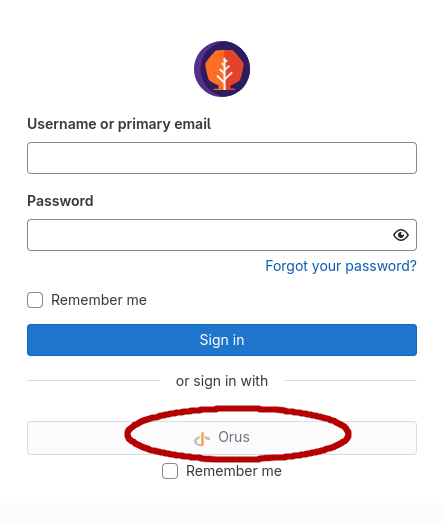
Step 2: Keycloak sign-in page
Once you have landed on id.orus.io, follow the "Register" link ("Enregistrement" if your browser is configured in French).
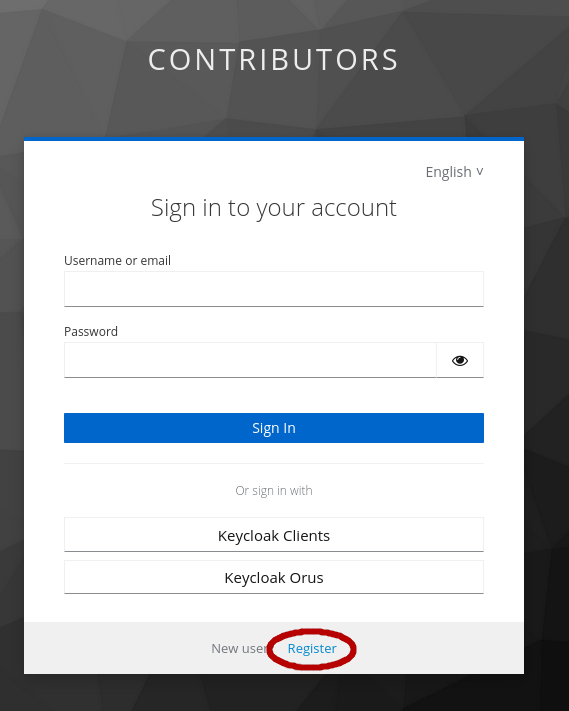
Step 3: Keycloak registration form
Fill-in the form
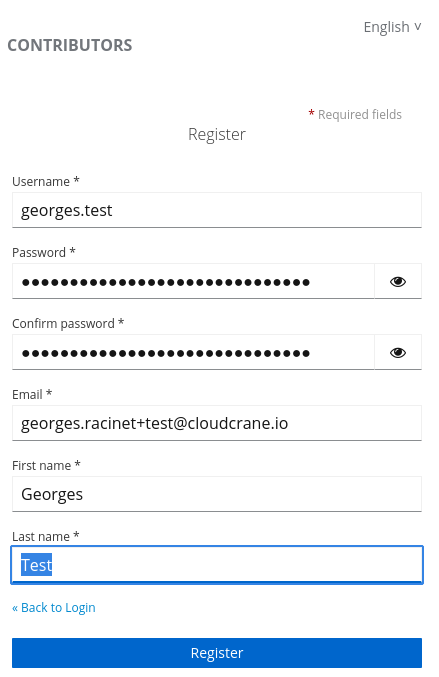
Step 4: Back to orus.io
you should now have landed on orus.io, and see the pending approval banner.
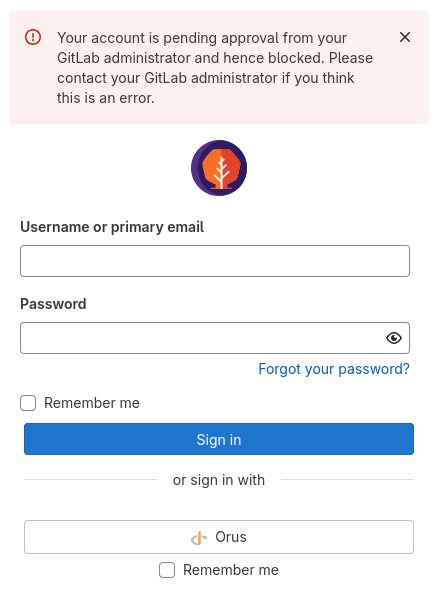
At this point it is likely that we will contact you to check what your access request is about, as it may be for other reasons than downloading Heptapod binaries.
We will then both activate your account and grant you enough permissions on the Heptapod Distribution group. In case the account is activated and you do not see the projects in that group, use the "Require access" feature.
Here is how it looks on mobile:
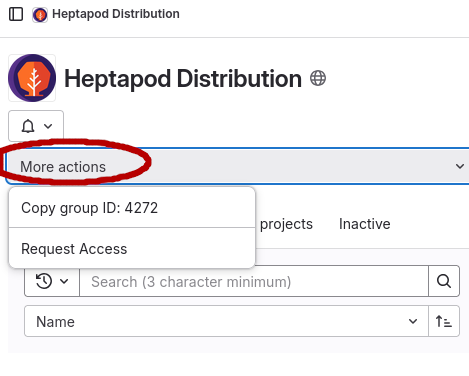
In the desktop computer view, the "More actions" menu is the vertical dots menu on the top right:
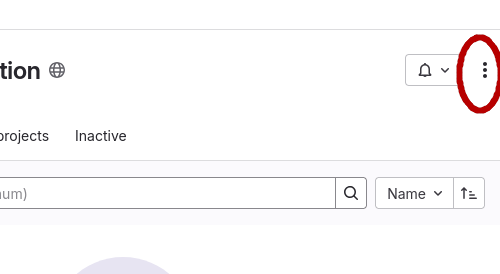
Step 5: Create a Personal Access Token
All downloads will have to be performed with a Personal Access Token with the "Read registry" scope.
Go to the Access tokens page of your profile settings:
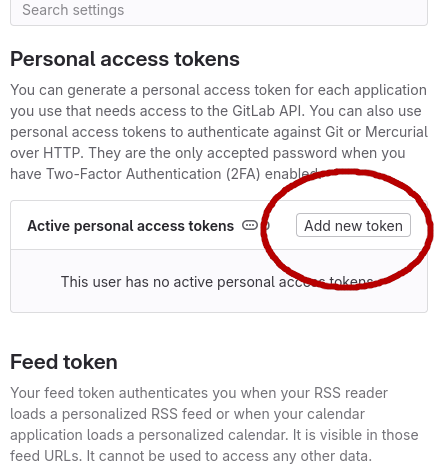
In the next screen, Select the read_registry scope and submit the form.
Step 6: Keep and check the token
Do not leave this page until you have used the Copy button to retrieve the token – it will not be offered again, ever. Store it in your secure wallet system.
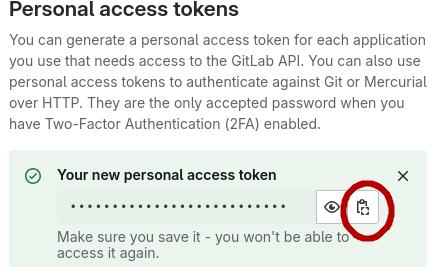
Use the token from now on as if it were your password:
docker login registry.orus.io
You can now pull images, for instance:
docker pull registry.orus.io/heptapod-distribution/heptapod:17.6.1
Main Docker images
Docker production images
Our production-grade main container images are available with authentication from our registry at orus.io. One you have performed the Registration procedure above, you will be able to
browse the registry of the Heptapod Distribution group. Here is a direct URL for the main images, not visible without authentication:
https://orus.io/groups/heptapod-distribution/-/container_registries/209
pull images, such as:
docker pull registry.orus.io/heptapod-distribution/heptapod:17.6.1
The images work in the same way as the upstream GitLab CE image. The access will stay free of charge during the first quarter of 2025.
The versioning policy is that the two first numbers (minor version) coincide with GitLab, while the third usually differs. For instance, Heptapod 17.6.1 is based on GitLab 17.6.3.
Versions series before 17.6 are still available on Docker hub, and subsequent patch updates for them will also be pushed there.
There ongoing work, towards a Cloud Native distribution, with all internal services running in different containers. This will be the equivalent of Cloud Native GitLab.
Docker testing images
For evaluation purposes, we will keep on publishing the release candidates (RC) to Docker Hub. For example:
docker pull heptapod/heptapod:17.6.0rc1
These images work generally almost as well as the final versions, and are up to date with all GitLab upstream security patches at the time of release, but they don't get any further updates once the corresponding final version is out.
For perspective, there is a new Heptapod x.y.0rc1 version roughly every month, ideally the day after the GitLab CE x.y.1 release.
CI/CD: Heptapod Runner
Heptapod Runner is the natural companion for Heptapod, in the same way as GitLab Runner is for GitLab: this is the piece of software to install on the systems that will run the pipeline jobs.
As of version 0.2.0, it's able to run jobs for Heptapod and GitLab servers, provided all versions are compatible.
Docker
Heptapod Runner is also available as a Docker image (don't miss the statement about compatibility of versions).
Standalone executable
Heptapod Runner can be downloaded directly as a standalone executable for various operating systems and architectures from the runner area of our download site.
The executable itself and its signatures can be found under the binaries subdirectory (see our signature checking instructions).
Other subdirectories provide useful complements, such as systemd, that contains sample files to run it as a service on systemd-based Linux distributions.
From source
Heptapod Runner can of course be compiled from source.
Browse the code online, bug reports, merge requests
One may install Heptapod entirely from source. This is basically the GitLab source installation procedure, with some components replaced by ours and some extra steps.
Heptapod is self-hosted on the public Heptapod instance for Free and Open Source Software.
You can use it to browse the source and of course checkout the sources with Mercurial:
hg clone https://foss.heptapod.net/heptapod/heptapod
Registration is open. It is possible to register in one click with GitHub and Bitbucket accounts. That is enough to start filing issues and comment on merge requests.
See also the Documentation area to start contributing further.